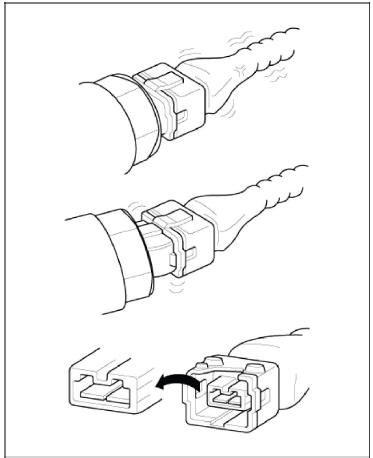Hyundai Tucson: Intermittent Problem Inspection Procedure
Sometimes the most difficult case in troubleshooting is when a problem symptom occurs but does not occur again during testing. An example would be if a problem appears only when the vehicle is cold but has not appeared when warm. In this case, the technician should thoroughly make out a "Customer Problem Analysis Sheet" and recreate (simulate) the environment and condition which occurred when the vehicle was having the issue.
- Clear Diagnostic Trouble Code (DTC).
- Inspect connector connection, and check terminal for poor connections, loose wires, bent, broken or corroded pins, and then verify that the connectors are always securely fastened.

- Slightly shake the connector and wiring harness vertically and horizontally.
- Repair or replace the component that has a problem.
- Verify that the problem has disappeared with the road test.
- Simulating Vibration
a. Sensors and Actuators
: Slightly vibrate sensors, actuators or relays with finger.
WARNING
Strong vibration may break sensors, actuators or relays
b. Connectors and Harness : Lightly shake the connector and wiring harness vertically and then horizontally.
- Simulating Heat
a.Heat components suspected of causing the malfunction with a hair dryer or other heat source.
WARNING
- DO NOT heat components to the point where they may be damaged.
- DO NOT heat the ECM directly.
- Simulating Water Sprinkling
a. Sprinkle water onto vehicle to simulate a rainy day or a high humidity condition.
WARNING
DO NOT sprinkle water directly into the engine compartment or electronic components.
- Simulating Electrical Load
a.Turn on all electrical systems to simulate excessive electrical loads. (Radios, fans, lights, rear window defogger, etc.)
READ NEXT:
 Connector Inspection Procedure
Connector Inspection Procedure
Handling of Connector
a.Never pull on the wiring harness when disconnecting connectors.
b.When removing the connector with a lock, press or pull locking lever.
c.Listen for a click when locking connectors. This sound indicates that th
 Electrical Circuit Inspection Procedure
Electrical Circuit Inspection Procedure
Check Open Circuit
Procedures for Open Circuit
Continuity Check
Voltage Check
If an open circuit occurs (as seen in FIG. 1), it can be found by
performing Step 2 (Continuity Check Method) or Step 3
(Voltage Check Method) as sho
 Symptom Troubleshooting Guide Chart
Symptom Troubleshooting Guide Chart
Specifications
Fuel Delivery System
Sensors
Manifold Absolute Pressure Sensor (MAPS)
Type : Piezo-Resistive Pressure
Sensor type
Specification
Intake Air Temperature Sensor (IATS)
Type : Termistor type
Specific
SEE MORE:
 Engine Start/Stop button
Engine Start/Stop button
Whenever the front door is opened, the
Engine Start/Stop button will illuminate
and will go off 30 seconds after the door
is closed.
WARNING
To turn the vehicle off in an emergency:
Press and hold the Engine Start/Stop
button for more than
 Curtain Air Bag (CAB)
Curtain Air Bag (CAB)
Components Location
Curtain Air Bag (CAB)
Removal
Disconnect the batteiy negative terminal.
WARNING
After disconnecting the cables, wait at least 3 minutes.
Remove the roof trim.
(Refer to Body - "Roof Trim Assembly"
Information
- Home
- Hyundai Tucson - Fourth generation (NX4) - (2020-2023) - Owner's Manual
- Hyundai Tucson - Fourth generation (NX4) - (2020-2023) - Workshop Manual